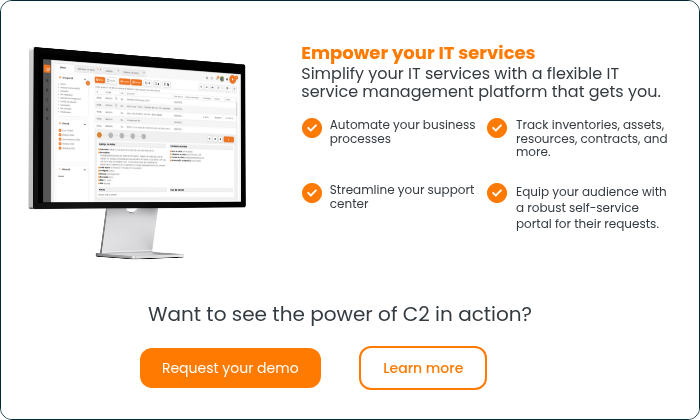AI, with Big Data, brings forth a capacity to collect and analyze enormous quantities of data, facilitating decision-making, offering better predictions of future trends and increasing efficiency and productivity. New possibilities will appear to automate your business processes and services for exceptional productivity.
An ITSM tool, thanks to artificial intelligence, can automatically determine the request of a client and provide him with dynamic forms, reacting based on the client’s choices, and proposing solutions from an evolutive database.
Automated actions can be executed based on business rules, tickets and tasks could be distributed automatically to the designated team or resource after an approbation, automated notifications can be sent to inform you of the status of a ticket, the maintenance of Configuration Items (CI) maintenance in your CMDB based on a change, you could set up an automated escalation process when your SLA requirements are not met.
Data is now received in real time. When can even receive personalized predictive reports? This is now a very real reality.
Take the lead and stand out!
Thus, artificial intelligence must be seen as an opportunity. It is already possible to use it in several parts of your current job:
To eliminate bottlenecks in your processes
The strength of artificial intelligence and automation lies in the tasks or parts of the process where the process slowed down. Often, repetitive and monotonous tasks can benefit from artificial intelligence, allowing one to complete them quickly.
Regardless of your sector of work, if there are bottlenecks in your processes, there is a good chance that AI can reduce or even eliminate them.
To create alerts
Are you close to failing to meet one or more of your Service Level Agreements (SLAs)? A simple business rule can alert teams of appropriate actions and save you a lot of trouble.
From simple automated alerts to notifying a ticket that needs to be processed before the end of the prescribed response time or to alert you of the deadline date for a ticket resolution, you can significantly improve your performance on your service agreements.
To help you make decisions
Artificial intelligence can collect an enormous amount of data, with the ability to analyze and pass these data in reports or tables to decision makers. An important decision will be taken with the most complete and accurate information possible.
Even simpler: you need information when you need it? Equip yourself with a digital assistant (Like the Siri, Cortana, or Alexa of this world) who will use his database to find you the answer in less than a minute.
Up to optimize your inventory management
AI can also manage your assets (physical inventory, equipment, infrastructure, software licenses, etc.). On the one hand, interconnected objects help you reap that huge amount of data we have written about earlier.
On the other hand, these objects and your other IT assets can be managed in a configuration management database (CMDB), where you can, among other things, automate their maintenance with business rules and mitigate the impacts of related incidents on the same equipment.





